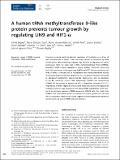| dc.contributor.author | Begley, Ulrike | |
| dc.contributor.author | Sosa, Maria Soledad | |
| dc.contributor.author | Avivar-Valderas, Alvaro | |
| dc.contributor.author | Patil, Ashish | |
| dc.contributor.author | Endres, Lauren | |
| dc.contributor.author | Estrada, Yeriel | |
| dc.contributor.author | Chan, Tsz Yan Clement | |
| dc.contributor.author | Su, Dan | |
| dc.contributor.author | Dedon, Peter C. | |
| dc.contributor.author | Aguirre-Ghiso, Julio A. | |
| dc.contributor.author | Begley, Thomas J. | |
| dc.date.accessioned | 2014-07-08T15:26:27Z | |
| dc.date.available | 2014-07-08T15:26:27Z | |
| dc.date.issued | 2013-04 | |
| dc.date.submitted | 2012-12 | |
| dc.identifier.issn | 17574676 | |
| dc.identifier.issn | 1757-4684 | |
| dc.identifier.uri | http://hdl.handle.net/1721.1/88185 | |
| dc.description.abstract | Emerging evidence points to aberrant regulation of translation as a driver of cell transformation in cancer. Given the direct control of translation by tRNA modifications, tRNA modifying enzymes may function as regulators of cancer progression. Here, we show that a tRNA methyltransferase 9‐like (hTRM9L/KIAA1456) mRNA is down‐regulated in breast, bladder, colorectal, cervix and testicular carcinomas. In the aggressive SW620 and HCT116 colon carcinoma cell lines, hTRM9L is silenced and its re‐expression and methyltransferase activity dramatically suppressed tumour growth in vivo. This growth inhibition was linked to decreased proliferation, senescence‐like G0/G1‐arrest and up‐regulation of the RB interacting protein LIN9. Additionally, SW620 cells re‐expressing hTRM9L did not respond to hypoxia via HIF1‐α‐dependent induction of GLUT1. Importantly, hTRM9L‐negative tumours were highly sensitive to aminoglycoside antibiotics and this was associated with altered tRNA modification levels compared to antibiotic resistant hTRM9L‐expressing SW620 cells. Our study links hTRM9L and tRNA modifications to inhibition of tumour growth via LIN9 and HIF1‐α‐dependent mechanisms. It also suggests that aminoglycoside antibiotics may be useful to treat hTRM9L‐deficient tumours. | en_US |
| dc.description.sponsorship | National Institute of Environmental Health Sciences (R01 ES015037) | en_US |
| dc.description.sponsorship | National Institute of Environmental Health Sciences (R01 ES017010) | en_US |
| dc.description.sponsorship | National Institute of Environmental Health Sciences (R21 ES017146) | en_US |
| dc.description.sponsorship | National Institute of Environmental Health Sciences (P30 ES002109) | en_US |
| dc.description.sponsorship | National Cancer Institute (U.S.) (R01 CA109182) | en_US |
| dc.description.sponsorship | National Cancer Institute (U.S.) (U54 CA163131) | en_US |
| dc.description.sponsorship | National Science Foundation (U.S.) (NSF 0922830) | en_US |
| dc.description.sponsorship | NYSTAR | en_US |
| dc.description.sponsorship | Westaway Research Fund | en_US |
| dc.description.sponsorship | Singapore-MIT Alliance for Research and Technology | en_US |
| dc.description.sponsorship | Samuel Waxman Cancer Research Foundation Tumour Dormancy Program | en_US |
| dc.description.sponsorship | NYSTEM | en_US |
| dc.language.iso | en_US | |
| dc.publisher | Wiley Blackwell | en_US |
| dc.relation.isversionof | http://dx.doi.org/10.1002/emmm.201201161 | en_US |
| dc.rights | Creative Commons Attribution 3.0 | en_US |
| dc.rights.uri | http://creativecommons.org/licenses/by/3.0/ | en_US |
| dc.source | Wiley Blackwell | en_US |
| dc.title | A human tRNA methyltransferase 9-like protein prevents tumour growth by regulating LIN9 and HIF1-α | en_US |
| dc.type | Article | en_US |
| dc.identifier.citation | Begley, Ulrike, Maria Soledad Sosa, Alvaro Avivar-Valderas, Ashish Patil, Lauren Endres, Yeriel Estrada, Clement T.Y. Chan, et al. “A Human tRNA Methyltransferase 9-Like Protein Prevents Tumour Growth by Regulating LIN9 and HIF1-α.” EMBO Molecular Medicine 5, no. 3 (March 2013): 366–383. | en_US |
| dc.contributor.department | Massachusetts Institute of Technology. Center for Environmental Health Sciences | en_US |
| dc.contributor.department | Massachusetts Institute of Technology. Department of Biological Engineering | en_US |
| dc.contributor.department | Massachusetts Institute of Technology. Department of Chemistry | en_US |
| dc.contributor.mitauthor | Chan, Tsz Yan Clement | en_US |
| dc.contributor.mitauthor | Su, Dan | en_US |
| dc.contributor.mitauthor | Dedon, Peter C. | en_US |
| dc.relation.journal | EMBO Molecular Medicine | en_US |
| dc.eprint.version | Final published version | en_US |
| dc.type.uri | http://purl.org/eprint/type/JournalArticle | en_US |
| eprint.status | http://purl.org/eprint/status/PeerReviewed | en_US |
| dspace.orderedauthors | Begley, Ulrike; Sosa, Maria Soledad; Avivar-Valderas, Alvaro; Patil, Ashish; Endres, Lauren; Estrada, Yeriel; Chan, Clement T.Y.; Su, Dan; Dedon, Peter C.; Aguirre-Ghiso, Julio A.; Begley, Thomas | en_US |
| dc.identifier.orcid | https://orcid.org/0000-0003-0011-3067 | |
| dc.identifier.orcid | https://orcid.org/0000-0001-7940-3459 | |
| dspace.mitauthor.error | true | |
| mit.license | PUBLISHER_CC | en_US |
| mit.metadata.status | Complete | |
